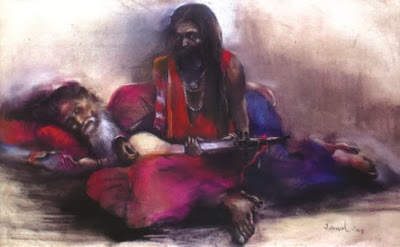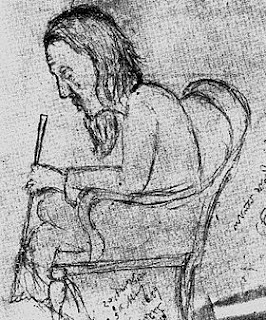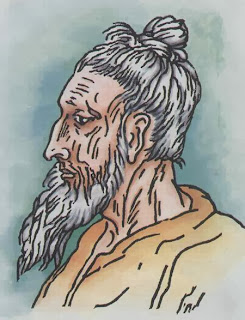
'AMI TARAE KHUJE BERAI...............'
The search continues………………Rabindranath did and so did Lalon………….
The unfathomable interest and popularity of their songs are due as much to the lofty idealism of their thoughts as to the literary grace and beauty of their songs. Rabindranath's teaching, with its vital faith in the redeeming power of the spiritual forces and their up building energy, has a particular value at the present moment, when the civilized world is passing through the crucible of a ghastly war which, whether or not it purges the nations of their pride and hate, lust for gold and greed of land, at least proclaims, in no uncertain tones, the utter bankruptcy of materialism. Similarly Lalon Geete’, which expounded humanity over all social and religious dogmas. As he has no faith on the religions and society which are based on so many binaries like caste, class, gender, region etc and as his main concern is humanity, his songs are the main weapons against those binaries. To Lalon, ‘man’ is his main concern and man’s heart is the only place where God resides whom Lalon calls as ‘moner manus’.
To be great is not merely to be talked about, it is also to be misunderstood, and Rabindranath has not escaped this fate. The many attempts made to explain him contradict each other, for "from the words of the poet men take what meanings please them." There are two views regarding his philosophy of life. If we believe one side, he is a Vedantin, a thinker who draws his inspiration from the Upanishads. We believe the other, he is an advocate of a theism more or less like, if not identical with, Christianity. Rabindranath inclines to the former view. “To me the verses of the Upanishads and the teachings of Buddha have ever been things of the spirit, and therefore endowed with boundless vital growth; and I have used them, both in my own life and in my preaching, as being instinct with individual meaning for me, as for others, and awaiting for their confirmation my own special testimony, which must have its value because of its individuality.
"

Whereas Lalon’s philosophy is the philosophy of searching the ‘moner manus’ that has no caste, no religion, no gender bias, after all on realization of which presence men can attain the eternal bills. From Lalon’s vast composed songs we have a spectrum of his outlooks towards caste, class, religion and gender biased society and Lalon’s own opinions to that issue. Though Lalon Shah had no educational degree from any institute, as a self-learned philosopher how through his songs he is a time-wining sprit. Around the middle of the thirteenth century, the whole of Bengal fell into Muslim hands, and the new rulers launched a campaign for the spread of Islam.
As a consequence, a great many people who held marginal positions within the structure of Hindu society, many of whom may have been Sahajiyas, embraced Islam. Some, however, became converts in name only, as a survival tactic, and continued to follow their Sahajiya practices. These Muslim Sahajiyas were among the first fakirs of Bengal. At the same time, various Sufi orders of Islam began to penetrate Bengal. As they essentially practiced a cult of mystic love, their creed was based on self-realization and was found to have many features in common with the Sahajiya tradition. A large number of people became their recruits, including the Muslim Sahajiyas, who found in Sufism a kind of shelter from the oppression of orthodox Islam. This led very naturally to considerable intermingling of ideas. Even the Vaisnava Sahajiyas, who had emerged with renewed vigor after the advent of the great Vaisnava saint Sri Caitanya Deva in the fifteenth and sixteenth centuries, did not escape the influence of Sufi mysticism. Out of this background-Sahajiya for the most part, but somewhat colored by Sufi ideology- emerged the sect of the Bauls, which thus included within its fold both Hindus and Muslims, especially of the lower strata of society. Bauls would seem to have begun to be widely spread in Bengal only around the middle of the seventeenth century and it still exists.
The other view holds that Rabindranath Tagore, like other regenerators of Hinduism, has freely borrowed from Christianity and Western teaching, and has woven these alien elements into the woof of his own faith. If he does not confess his indebtedness to the West, it is, in the words of the Spectators reviewer, a case of "local patriotism," "in gratitude," and " insincerity." His personality is completely revealed in his poems, which are the unconscious expression of his soul, the outpourings of his devotional heart, and the revelation of his poetic consciousness. His writings must and do contain suggestions of his intellectual creed. Though poetry is not philosophy, it is possible for us to derive from Rabindranath's works his philosophical views.

The origin of Baul tradition and the community, at a sense, clearly shows the tensions of their existence, their marginal condition at the society which leads them to their secret ‘sadhana’ (meditation) for ‘Moner Manus’ (Man of the heart). As most of the peoples from Baul community are illiterate, they follow the oral tradition and their songs decent from generation to generation only by listening and memorizing process. As they are from the common masses their songs are decorated with simple and rustic allegory and at the same time they shows the contemporary society, its good and evils mainly to the village folks. Fakir Lolon Shah (1774-1890) is the main pioneer and the greatest spoke-person of the marginalized Baul tradition of the undivided Bengal.
Rejecting the religious institutions and their constitutional dogma, Fakir Lalon Shah has created a world which is based on human and humanity. This multifaceted personality was a social minded persona and the-then society’s problem had touched him deeply. So through his songs he has raised his voice against class, caste, religious malice and so many social issues which we can still observe in our Pan-Indian society. This self- learned folk-poet’s conscious outlook towards society and poetic power was amazing. For the uniqueness of theme, language, music and rhetoric of his songs, it attracts the great minds like Rabindranath Tagore. The main contribution of Lalon Shah is, that, he has given a lower class’s folk-religion’s songs to the height of a literature. The voice of Fakir Lalon Shah, his songs and philosophy are now not limited within Bengal and Bengali speaking area, rather these have spread all over the world. Now Lalon Shah has become the symbol of world fraternity, humanity, equality and peace.
One question may be aroused that how this illiterate man’s folk has attracted the master minds like Rabindranath Tagore, a son of a Zaminder, as we already observed that Baul tradition is a tradition of the homeless nameless village folk’s. If we have a small overview on Bengal Renaissance and Tagore’s family’s relation with it, that will be clearto us. The concept of the Renaissance in Bengal posited in the context of British colonial rule is based on the fundamental premise that the western education and political infrastructure disseminated a sense of rule of law and justice and fostered "an intellectual development of the people on an entirely new line". And historians of differing ideological persuasions have accepted the concept of renaissance as some kind of awakening of the people especially in the cultural realm. But, as has been elaborately discussed in his article on Indian renaissance by Barun De, a model based on the European experience is unsuitable in the Indian context. The deliberate endeavour by the British to prevent the growth of enterprenual strata among the Indians forced the 'new elite' to concentrate on land business. Finding themselves unable to put up any fight against British rule they diverted their energy and power to cultural and social reforms. The compromise which the reformers of the 19th century tried to make was between their personal pecuniary position and liberal western ideas. That resulted in a contradiction between thought and action. The most significant phenomenon of the 19th century was the Brahmo movement. It was an anti-idolatrous religious reform movement. The movement was in the main a call to trim Hindu religious thought though it was not anti- Hindu in character. Debendranath Tagore, father of Rabindranath Tagore, one of the great figures of Brahmo movement gave the movement a theistic character. Under his leadership young Brahmos were prepared to go in advocating some social reforms such as intercaste marriage, and discarding some Braminical traditions. They challenged the righteousness of the Brahmo preachers who used to wear the Brahmin symbol the sacred thread.
Folk-religion Baul is deeply based on songs, of which most of the familiar songs are composed by Fakir Lalon Shah and his followers. Those songs which are composed by Lalon Shah are known as ‘Lalon Geete’. As Lalon used to stay at a hermitage of a rural area of Bengal, he was well concerned about the down-to-earth people and his songs convey the personal, social and cultural matter of the-then society which is still modern in the present social context. ‘Man’ is the first and final concern of ‘Lalon Geete’. Greek thinker Protagoras says, “Man is the measure of all things, of things that are that they are and of things that are not that they are not.” Those who blindly believe on god and religion do not allow men’s supreme position rather their religious dominance, abstract philosophy and scriptures force men to go through the religious, cultural and socio- economical differences. By the concept of rebirth and heaven they try to control human beings which make men a helpless doll of the fate. Through the folk-materialistic outlook the Bauls preach that if this world is created by the same Creator, if this world is His cosmic enblame then why this caste system, why so many religions, why this gender discriminations, why this class dominations and the Bauls try to create a ‘man’ based society and culture.
According to Lalon the source of Truth and Knowledge is not an abstract one rather it is a ‘man-guru’. One of his songs Lalon says:
“Dube dakh dekhi mone kirup lilamay. Akash-patal khujish jare ai dehe se roy.”
This means if we think deeply the existence of the God or the source of eternal bliss, we need not to roam here and there, it resides in our body. Thus, here we can observe the direct realization of creator into creation which Underhill has described in his essay ‘Science of ultimate’ as “on one hand as a temperamental reaction to vision of reality, on the other as a form of prophecy.” Tukaram, the Indian saint, says : " O man, why do you travel from place to place to search God? As the deer does not know that it possesses an invaluable thing called kasthuri (musk), so you' do not know what is within you. Search God within you and you will find Him." Rabindranath says: “You were in the centre of my heart, therefore when my heart wandered she never found you."
The traveller has to knock at every alien door to come to his own, and one has to wander through all the outer worlds to reach the innermost shrine at the end. In the moral life, where we have the individual attempting to reach the goal, we have the endless succession in time which belongs to the finite; but when moral life is swallowed up in religion, then the spirit transcends time and attains a timeless immortality.
Lalon has no faith or support to the showiness of the religious retuals. To him‘dharma’ is a belief which keeps a man’s qualities intact within himself and it resides into human heart and men as human being its ‘dharma’ is humanity. One of songs where Lalon says-
“Matir dhibe kather chobi; Bhoot bhabe sab deva-devi Vhole na se esob rupa
O je manus-ratan chene.
Jinn-fereshtar khela Pecha-pechi alavhola Tar nayan hoy na vhola
O je manus voje dibyagayn ea.”
The meaning of this song is that those who know human and humanity (manus-ratan), they cannot be lured by any idol (matir dhibi) and supernatural things. Those men, who keep believe in human and humanity, to them man is God and humanity is his way. Here in this song we can hear the echo of the main tenets of the Brahmo Samaj.


Well researched but could be written better. The sequence of events and facts need more focus. I'm the wrong person to comment on this piece because I'm very critical and get carried away...
ReplyDeleteArijit, u could be knowing better but u know in our literature there were a trend, where u have to add the thired line to fulfil a triangle, in that course sorry to say dt this is fab
ReplyDelete